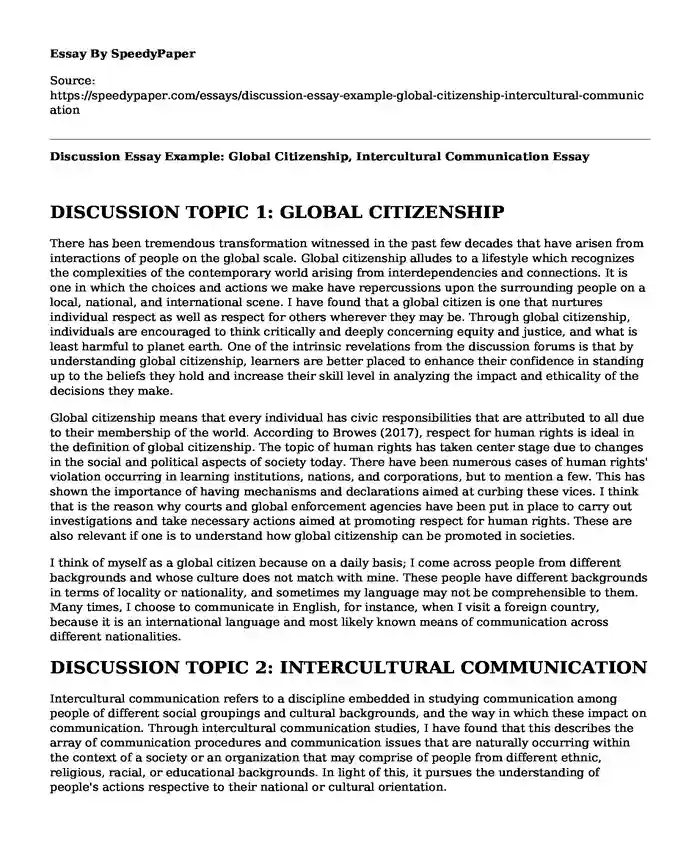
| Type of paper: | Case study |
| Categories: | Globalization Intercultural communication |
| Pages: | 3 |
| Wordcount: | 755 words |
DISCUSSION TOPIC 1: GLOBAL CITIZENSHIP
There has been tremendous transformation witnessed in the past few decades that have arisen from interactions of people on the global scale. Global citizenship alludes to a lifestyle which recognizes the complexities of the contemporary world arising from interdependencies and connections. It is one in which the choices and actions we make have repercussions upon the surrounding people on a local, national, and international scene. I have found that a global citizen is one that nurtures individual respect as well as respect for others wherever they may be. Through global citizenship, individuals are encouraged to think critically and deeply concerning equity and justice, and what is least harmful to planet earth. One of the intrinsic revelations from the discussion forums is that by understanding global citizenship, learners are better placed to enhance their confidence in standing up to the beliefs they hold and increase their skill level in analyzing the impact and ethicality of the decisions they make.
Global citizenship means that every individual has civic responsibilities that are attributed to all due to their membership of the world. According to Browes (2017), respect for human rights is ideal in the definition of global citizenship. The topic of human rights has taken center stage due to changes in the social and political aspects of society today. There have been numerous cases of human rights' violation occurring in learning institutions, nations, and corporations, but to mention a few. This has shown the importance of having mechanisms and declarations aimed at curbing these vices. I think that is the reason why courts and global enforcement agencies have been put in place to carry out investigations and take necessary actions aimed at promoting respect for human rights. These are also relevant if one is to understand how global citizenship can be promoted in societies.
I think of myself as a global citizen because on a daily basis; I come across people from different backgrounds and whose culture does not match with mine. These people have different backgrounds in terms of locality or nationality, and sometimes my language may not be comprehensible to them. Many times, I choose to communicate in English, for instance, when I visit a foreign country, because it is an international language and most likely known means of communication across different nationalities.
DISCUSSION TOPIC 2: INTERCULTURAL COMMUNICATION
Intercultural communication refers to a discipline embedded in studying communication among people of different social groupings and cultural backgrounds, and the way in which these impact on communication. Through intercultural communication studies, I have found that this describes the array of communication procedures and communication issues that are naturally occurring within the context of a society or an organization that may comprise of people from different ethnic, religious, racial, or educational backgrounds. In light of this, it pursues the understanding of people's actions respective to their national or cultural orientation.
Stereotypes distract the course to effective intercultural communication. The stereotype often leads to misplaced judgment on the basis of immediately visible characteristics of a person in relation to their age, gender, or race. Stereotyping leads to bias and enforces the belief that is cognitively developed. I live in a society where females are deemed less capable than their male counterpart. However, from studying intercultural communication, it is evident that women and girls are just as capable as boys and men. For instance, it was perceived that men make better drivers, and therefore I find that there are more male truck drivers than female drivers. Most recently, there has been a surge in the number of female truck drivers on the roads today. This goes to show that the stereotypes of females being less capable than men are only cognitively developed biases and entirely misplaced.
I have been mainly interested in understanding the African culture. The conventionality of this culture intrigues me especially the variations and manifold. It consists of a mixture of nations which have various tribes with each having their own unique traits. Despite being part of the African continent and the African Diaspora, the variations are quite extensive. I do not think communicating with people of the African descent can be problematic because, with the vast globalization, there are various vessels that can ease my communication with the members of this culture. Additionally, there has been great internationalization that has 'reduced' the size of the planet and people have become unionized in the way in which they communicate. It would not be difficult finding English speakers amongst the members of the African culture.
Cite this page
Discussion Essay Example: Global Citizenship, Intercultural Communication. (2022, Aug 01). Retrieved from https://speedypaper.net/essays/discussion-essay-example-global-citizenship-intercultural-communication
Request Removal
If you are the original author of this essay and no longer wish to have it published on the SpeedyPaper website, please click below to request its removal:
- Free Essay which Contains the Leadership Development Plan
- Essay Sample: How Did the Market Revolution Spark Social Change
- Free Essay: Effect of Refrigeration and Covering of Mayonnaise on the Growth of Bacteria
- Essay Example: Business Communication and Corporate Culture in India
- Living & Working Together: Language & Culture - Essay Sample
- Free Essay Example. Poetry on Post-Modernism
- Essay Sample on Crisis of Liberal Democracy in Europe
Popular categories




